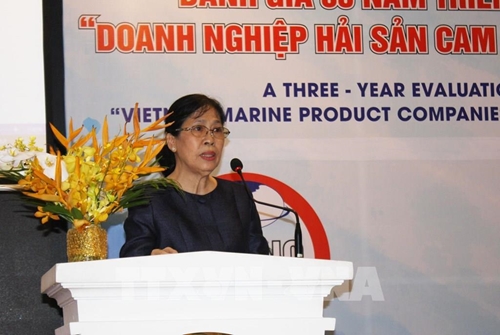The message was delivered by leading officials of the Vietnam Association of Seafood Exporters and Producers (VASEP) at a workshop evaluating the three-year implementation of the “Vietnam Marine Product Companies Commit to Combat IUU Fishing” program in Ho Chi Minh City on October 31.
VASEP statistics showed that the “yellow card” has made Vietnam’s seafood exports to the EU decrease continuously since 2018. The country’s export turnover of seafood declined by 6 percent in 2018, 15 percent in 2019, and 13 percent in the first nine months of this year.
From the second biggest importer of Vietnamese seafood with a value of 380-480 million USD a year, the EU now ranks fifth, after Japan, the US, the Republic of Korea and ASEAN.
    |
 |
|
Nguyen Thi Thu Sac, VASEP Vice President and head of its Seafood Committee speaking at the event |
Nguyen Thi Thu Sac, VASEP Vice President and head of its Seafood Committee, said that the EU, however, remains important partner of Vietnam’s fishery sector. Therefore, the association and the seafood business community are exerting every effort to maintain this market.
At present, 82 percent of fishing vessels are equipped with position monitoring devices, the trace for seafood origins has improved, and the legal framework has gradually completed.
Many delegates attending the workshop emphasised the need to raise fishermen’s awareness of abiding by EC recommendations.
Vietnam is exerting efforts to prevent IUU fishing so as to persuade the EC to remove the “yellow card” warning, which was issued in October 2017 as the country had failed to demonstrate sufficient progress in the fight against IUU fishing.
Countries that fail to meet EC standards are given a "yellow card", followed by a "green card" if the problems are resolved, or a "red card" if they are not. A red card can lead to a trade ban on aquatic products.
Source: VNA